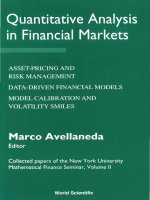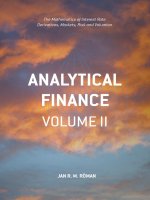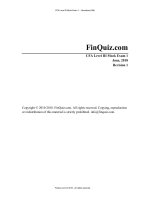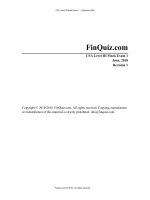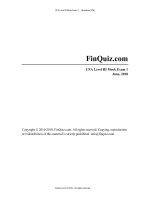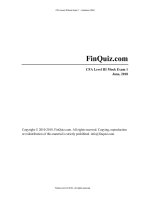Volume II behavioral finance, individual investors, and institutional InvestorsCFA level 3CFA finquiz Level3Mock2018Version1JuneAMSolutions
Bạn đang xem bản rút gọn của tài liệu. Xem và tải ngay bản đầy đủ của tài liệu tại đây (286.01 KB, 44 trang )
CFA Level III Mock Exam 1 – Solutions (AM)
FinQuiz.com
CFA Level III Mock Exam 1
June, 2018
Revision 1
Copyright © 2010-2018. FinQuiz.com. All rights reserved. Copying, reproduction
or redistribution of this material is strictly prohibited.
FinQuiz.com © 2016 - All rights reserved.
CFA Level III Mock Exam 1 – Solutions (AM)
FinQuiz.com – 1st Mock Exam 2018 (AM Session)
The morning session of the 2018 Level III CFA Examination has 9 questions. For
grading purposes, the maximum point value for each question is equal to the number of
minutes allocated to that question.
Questions Topic
Minutes
1
Portfolio Management – Individual Investor
36
2
Portfolio Management – Institutional Investors
28
3
Portfolio Management – Economics
10
4
Portfolio Management – Asset Allocation
25
5
Portfolio Management – Fixed-Income Investments
15
6
Portfolio Management – Equity Investments
20
7
Portfolio Management – Risk Management
20
8
Portfolio Management –
Monitoring and Rebalancing
17
9
Portfolio Management – Performance Evaluation and Attribution
9
Total:
FinQuiz.com © 2016 - All rights reserved.
180
CFA Level III Mock Exam 1 – Solutions (AM)
QUESTION 1 HAS FOUR PARTS (A, B, C, D) FOR A TOTAL OF 36 MINUTES.
Simon Becker is a 45 years old stock broker at P.S. Salow, a well-respected firm with a
long history. Simon is sitting down with J.D. Smithson, the advisor that manages his
retirement portfolio, to plan his retirement and other needs.
Simon has done well and would like to retire in ten years. He is married and his two twin
boys will soon be moving out and attending college at the same time he is starting
retirement. While he does not plan on paying their entire tuition, he would like to give
them a one-time gift of $25,000 each when they move out.
Simon and his wife, who works as a medical examiner, would like to retire and buy a
vacation home in Miami, which will cost about $200,000. They currently rent a home and
have no significant debts or mortgages.
The Becker’s currently have an investment portfolio of $1,250,000 in a money market
account. They would like to buy an annuity for $2,000,000 when they retire that will
cover their annual expenses. While the Beckers have worked hard to fund their portfolio
to this point, they do not want to contribute any more for their remaining years to
retirement. While he is familiar with the concept of risk and return, Mr. Becker has seen
many of his coworkers lose their entire life savings to speculative investments. He feels
that he and his wife have worked hard to save up and are pretty well set for their
retirement.
A. Formulate each of the following constraints for Mr. Becker’s investment policy
statement (IPS):
i.
ii.
iii.
time horizon
unique circumstances
liquidity
(6 minutes)
B. State the return objective and risk tolerance statement for Mr. Becker’s IPS. Risk
tolerance should include ability, willingness and an overall tolerance.
(12 minutes)
C. Calculate the required average annual pretax nominal rate of return for the IPS.
Show your calculations.
(9 minutes)
FinQuiz.com © 2016 - All rights reserved.
CFA Level III Mock Exam 1 – Solutions (AM)
Five years have passed and the Beckers have recently inherited a substantial amount of
money from a relative. In addition, the Beckers have reassessed their plans in retirement
and would like to live a more lavish lifestyle which will require more expenses. To
accomplish this, Mr. Becker has decided to put part of their money to private equity and
hedge funds.
D. Identify two factors that change Mr. Becker’s ability or willingness to take risk
and state whether the factor increases or decreases risk tolerance.
Answer Question 1-D in the Template provided on page 5.
(10 minutes)
FinQuiz.com © 2016 - All rights reserved.
CFA Level III Mock Exam 1 – Solutions (AM)
Template for Question 1-D
Choose whether the
affect is to
willingness or ability
to tolerate risk
Choose whether the
affect is an increase
or decrease in risk
tolerance
Ability
Increase
Willingness
Decrease
Ability
Increase
Willingness
Decrease
Identify two factors that change Mr.
Becker's risk tolerance.
FinQuiz.com © 2016 - All rights reserved.
CFA Level III Mock Exam 1 – Solutions (AM)
Solution for Question 1.
A Solution:
i. Time Horizon
The Beckers have a two-stage time horizon; 10 years to planned retirement and
children’s college; then greater than 30 years in retirement.
ii. Unique Circumstances
Mr. Becker’s job as a stock broker means his income may be correlated with the
performance of the stock market so it may be appropriate to correlate his
investment portfolio more closely with fixed income products and other safer
investments.
iii. Liquidity
The Beckers have no immediate large one-time cash needs.
Reference:
CFA Level III, Volume 2, Study Session 4, Reading 8.
B Solution:
Return Objective
The Beckers would like to purchase an annuity product worth $2,000,000 in ten years to
fund their retirement expenses and buy a retirement home in Miami. They need to grow
their current portfolio by enough to fund the purchase of the annuity and the retirement
home, plus gift $50,000 to their children.
Risk Tolerance
The Becker’s risk tolerance is below average because of a lower than average willingness
Ability- The Becker’s ability to tolerate risk is average given the size of their portfolio
and low immediate needs for liquidity
Willingness- The Becker’s willingness to tolerate risk is below average given Mr.
Becker’s statements about coworkers.
Reference:
CFA Level III, Volume 2, Study Session 4, Reading 8.
FinQuiz.com © 2016 - All rights reserved.
CFA Level III Mock Exam 1 – Solutions (AM)
C Solution:
Investment Portfolio (pretax)
Cash Outflows at Retirement
Gift to Children
Cost of Retirement Home
Required to Buy Annuity
$1,250,000
$50,000
$200,000
$2,000,000
$2,250,000
Required Return Calculation
Present Value
Future Value
Annual Contribution (PMT)
Number of Years (N)
$1,250,000
$2,250,000
$0
10
àCompute I/Y Pretax Nominal
6.05%
Reference:
CFA Level III, Volume 2, Study Session 4, Reading 8.
FinQuiz.com © 2016 - All rights reserved.
CFA Level III Mock Exam 1 – Solutions (AM)
D Solution:
Template for Question 1-D
Choose whether
the affect is to
willingness or
ability to
tolerate risk
Choose whether
the affect is an
increase or
decrease in risk
tolerance
Ability
Increase
Willingness
Decrease
Ability
Increase
Willingness
Decrease
Identify two factors that
change Mr. Becker's risk
tolerance.
The large inheritance increases
their ability to take risks
because it decreases the
proportion of expenses to total
assets.
Their willingness to take risk
is increased by Mr. Becker's
willingness to invest in riskier
assets like private equity and
hedge funds.
Reference:
CFA Level III, Volume 2, Study Session 4, Reading 8.
FinQuiz.com © 2016 - All rights reserved.
CFA Level III Mock Exam 1 – Solutions (AM)
QUESTION 2 HAS FOUR PARTS (A, B, C, D) FOR A TOTAL OF 28 MINUTES.
Iowa State University is a public, tax-exempt institution that receives a portion of its
funding needs from an endowment. Each year, the endowment pays out 3.5% of last
year’s market value to fund the current year’s spending needs. The market value of the
endowment last year was $250 million dollars, which means that this year’s funding will
be approximately 15% of the university’s total needs. The university would like to
maintain this level of support into the future. As a publicly funded institution the
investment committee is wary of certain investments that contradict with the university’s
policy of a moral and healthy lifestyle.
The inflation rate in the United States, according to the consumer price index, is expected
to be 2.5% for the foreseeable future. Educational expenses have been increasing faster
than consumer prices, at about 4% per year. Management expenses for the endowment
are one half of a percent per year.
The markets have been especially volatile over the last few years and the university
investment committee is worried that they may not be able to meet spending needs in the
future. Several of the past years have seen dramatic swings in the total assets of the fund
and large drawdowns after yearly spending needs. The committee has asked their
portfolio advisor to look into the situation and recommend possible actions.
The last five years history for the endowment and spending is shown below. (all dollar
amounts are in thousands USD)
Year Ending
December
Market
Value
2007
2008
2009
2010
2011
$200,000
$275,000
$325,000
$215,000
$250,000
3.5% Spending for
Next Year
$7,000
$9,625
$11,375
$7,525
$8,750
A. i. Formulate the return objective for the ISU endowment.
ii. Calculate the required return for the ISU endowment. Show your calculations
(6 minutes)
FinQuiz.com © 2016 - All rights reserved.
CFA Level III Mock Exam 1 – Solutions (AM)
B. i. Calculate the spending needs based on the three-year ruling average spending
rules. Show your calculations.
ii. Select whether the change in spending rule increases or decreases risk tolerance
and support with one reason.
Answer Question 2-B.ii in the Template provided on page 11.
(6 minutes)
C. Formulate each of the following constraints for the ISU endowment’s investment
policy statement (IPS):
i. Unique circumstances
ii. time horizon
iii. liquidity
(6 minutes)
The Save-a-Live Foundation is a nonprofit organization focused on providing support for
the homeless in and around Minneapolis, Minnesota. The foundation has a very large
investment portfolio left to it by a wealthy benefactor and receives much of its annual
spending needs through donations. The foundation is tax-exempt as long as it meets
minimum requirements for payment of proceeds set by the IRS.
D. Choose whether the risk tolerance component of the IPS is higher, lower, or no
different for the Save a Life foundation relative to the ISU endowment. Discuss
two reasons that support your answer.
Answer Question 2-D in the Template provided on page 12.
(10 minutes)
FinQuiz.com © 2016 - All rights reserved.
CFA Level III Mock Exam 1 – Solutions (AM)
Template for Question 2-B ii
Select whether the change in spending rule increases
or decreases risk tolerance
Increase
Decrease
FinQuiz.com © 2016 - All rights reserved.
Support with One reason
CFA Level III Mock Exam 1 – Solutions (AM)
Template for Question 2-D
Choose whether the risk tolerance
component of the IPS is higher, lower, or
no different for the Save a Life foundation
relative to the ISU endowment.
Discuss two reasons that support your
answer.
Higher
Lower
No Different
FinQuiz.com © 2016 - All rights reserved.
CFA Level III Mock Exam 1 – Solutions (AM)
Solution for Question 2.
A i. Solution:
The University’s objective is to maintain the real value of the endowment to provide
perpetual support to the university for about 15% of its annual budget.
A ii. Solution:
The required return for the endowment is:
(1.035)(1.04)(1.005) – 1 = 8.18%
Reference:
CFA Level III, Volume 2, Study Session 6, Reading 13.
B i. Solution:
Average of last three years’ market values = ($250 + $215 + $325)/3 = $263,333,000
Spending based on 3.5% = $9,216,670
B ii. Solution:
Template for Question 2-B ii
Select whether the change in spending
rule increases or decreases risk
tolerance
Increase
Decrease
Support with One reason
Using a rolling average spending rule
increases risk tolerance because there is
less volatility in spending in any given
year.
Reference:
CFA Level III, Volume 2, Study Session 6, Reading 13.
FinQuiz.com © 2016 - All rights reserved.
CFA Level III Mock Exam 1 – Solutions (AM)
C Solution:
i. Unique circumstances
Wary of the perception of some investments, the committee would most likely
prohibit investment in ‘vice’ stocks like tobacco, alcohol, and gambling.
ii. Time horizon
The endowment has a single-stage, long-term time horizon supporting the
university into perpetuity.
iii. Liquidity
The endowment is required to pay out 3.5% of its prior year market value plus
management expenses each year for a total liquidity need of 4.0%.
Reference:
CFA Level III, Volume 2, Study Session 6, Reading 13.
D Solution:
Template for Question 2-D
Choose whether the risk tolerance
component of the IPS is higher, lower, or
no different for the Save a Life foundation
relative to the ISU endowment.
Higher
Lower
No Different
Discuss two reasons that support your
answer.
The foundation has a higher ability to take
risk because its needs are met by donations
as well as having a sizeable portfolio
The foundation has a higher willingness to
take risk because it has no contractual
obligation to meet specific funding goals.
Reference:
CFA Level III, Volume 2, Study Session 6, Reading 13.
FinQuiz.com © 2016 - All rights reserved.
CFA Level III Mock Exam 1 – Solutions (AM)
QUESTION 3 HAS TWO PARTS (A, B) FOR A TOTAL OF 10 MINUTES.
Paul Shannon at Emerging Investments LLC is studying a country for part of his frontier
market growth portfolio. He is familiar with the country’s economic fundamentals but is
most concerned with the government’s structural policy.
A. List five general elements of a pro-growth government structural policy.
(5 minutes)
Paul consults with one of the other analysts at the firm who has also been studying the
country. The analyst has a few updates on economic fundamentals within the country.
Update #1: The government has nationalized various sectors and businesses citing public
welfare.
Update #2: The government has increased the amount budgeted to increase the number
and quality of public schools.
B. State whether each update is positive for economic growth in the country and
which element of structural policy is related.
(5 minutes)
FinQuiz.com © 2016 - All rights reserved.
CFA Level III Mock Exam 1 – Solutions (AM)
Solution for Question 3.
A Solution:
Five general elements of pro-growth government structural policy are:
i.
ii.
iii.
iv.
v.
Sound fiscal policy
Competition within the private sector is encouraged
Sound tax policy
Minimal intrusion into the private sector by the government
Infrastructure and human capital development are supported by the
government
Reference:
CFA Level III, Volume 3, Study Session 7, Reading 1.
B Solution:
Update #1: This is a negative to economic growth. Policy- Minimal intrusion into the
private sector by the government.
Update #2: This is positive for economic growth. Policy- Infrastructure and human
capital development are supported by the government.
Reference:
CFA Level III, Volume 3, Study Session 7, Reading 14.
FinQuiz.com © 2016 - All rights reserved.
CFA Level III Mock Exam 1 – Solutions (AM)
QUESTION 4 HAS THREEPARTS (A, B, C) FOR A TOTAL OF 25 MINUTES.
John Galt Investments has been experiencing some peculiarly volatile results across its
portfolios over the last year and its manager, Jim Blake, is anxious to find out why. Mr.
Blake speaks to each of his five portfolio managers and finds out that each manager was
using a different approach to asset allocation. To further complicate matters, while the
managers could describe their approach they did not know what the approach was
formally called.
Below is the transcript from each manager’s description of their approach:
Mr. Brown:
I have developed my approach through years of work as a manager. I
generally use a rule-based system that is widely used among professionals.
Ms. Emmet:
I have no particular view on expected class returns and my clients have an
average risk tolerance. My main goal is to design a well-diversified
portfolio.
Mrs. Jenkins: After having tried other approaches, I found one that is not as sensitive to
changes in input estimation. By drawing on historical averages of the
inputs, I can design a portfolio around a more stable efficient frontier.
Mr. Crowley: My portfolio is designed for institutional investors like banks and
insurance companies. These institutions are considered quasi-trust
fiduciaries and are required to meet their financial obligations.
Ms. Jones:
I have created a computer program that models possible capital market
assumptions and applies thousands of possible combinations over the
investing horizon. I then select the most appropriate allocation for the best
long-term results.
A. Given the statements by each manager, decide the most likely asset allocation
approach and describe one advantage of the approach. Possible allocation choices
are: Resampled Mean-Variance Optimization, Black-Litterman, Monte Carlo
Simulation, Asset-Liability Management, and Experienced-Based
Answer Question 4-A in the Template provided on page 19.
(15 minutes)
FinQuiz.com © 2016 - All rights reserved.
CFA Level III Mock Exam 1 – Solutions (AM)
Mr. Blake is now looking over the portfolio of Shawn Bryan, a private wealth client who
just inherited $1,740,000 from the sale of his father’s business in the United States. Bryan
plans to invest approximately $75,000 of this amount in a friend’s start-up firm in about
six months’ time. When talking to Blake about his goals, Bryan states that he would not
only like to invest in his friend’s firm without eroding the initial capital, but would also
like to earn a return that would at least cover inflation in the long-term. In setting Bryan’s
risk objective, Blake includes a risk tolerance of 4 for him. Based on his IPS, Blake
suggests three difference strategic asset allocations as given in Exhibit 1.
Exhibit 1: Strategic Asset Allocations for Blake’s Portfolio
Asset Allocation
A
B
C
Investor’s Forecasts
Expected Return
Standard deviation of Return
13.50%
22.00%
8.50%
16.00%
5.80%
11.00%
B. Recommend the most appropriate strategic asset allocation for Bryan based only
on his risk-adjusted expected returns. Show your calculations.
(5 minutes)
C. Justify a strategic asset allocation given Bryan’s threshold return and assuming a
normal return distribution. Show your calculations.
(5 minutes)
FinQuiz.com © 2016 - All rights reserved.
CFA Level III Mock Exam 1 – Solutions (AM)
Template for Question 4-A
Manager
Given the statements by
each manager, decide
the most likely asset
allocation.
Describe one advantage of the approach.
Mr. Brown
Ms. Emmet
Mrs. Jenkins
Mr. Crowley
Ms. Jones
FinQuiz.com © 2016 - All rights reserved.
CFA Level III Mock Exam 1 – Solutions (AM)
Solution for Question 4.
A Solution:
Template for Question 4-A
Manager
Mr. Brown
Given the statements by
each manager, decide
the most likely asset
allocation.
Experience - Based
Techniques
Ms. Emmet
Black-Litterman
Mrs. Jenkins
Resampled MeanVariance Optimization
Mr. Crowley
Asset-Liability
Management
Ms. Jones
Monte Carlo Simulation
Describe one advantage of the approach.
Easy to understand and implement
Provides a stable efficient frontier, Allows
portfolio constraints like negative weights
Small changes in inputs produce only minor
changes, Portfolios are better diversified than
traditional mean-variance
Considers asset allocation with respect to
liabilities to better meet requirements,
Generates a distribution of outcomes that is
more stable, Incorporates effect of various
capital market assumptions
Reference:
CFA Level III, Volume 3, Study Session 8, Reading 17,
B Solution:
Bryan’s utility for the three allocations is as follows:
Asset Allocation A:
13.5 – 0.005(4)(22)2
= 3.82%
Asset Allocation B:
8.5 -0.005(4)(16)2
=3.38%
Asset Allocation C:
5.8-0.005(4)(11)2
=3.38%
FinQuiz.com © 2016 - All rights reserved.
CFA Level III Mock Exam 1 – Solutions (AM)
Based on the certainty equivalent return Asset Allocation A would be preferred.
Reference:
CFA Level III, Volume 3, Study Session 8, Reading 17.
Solution C:
The threshold return equals: 75,000/1,740,000 = 4.3103%
Based on this threshold return and the safety-first criterion:
Allocation A:
13.50-4.3/22 = 0.42
Allocation B:
8.5-4.3/16 = 0.2625
Allocation C:
5.8-4.3/13.5 = 0.111
Based on the minimum required return, Allocation A should be selected since it has a
higher probability of meeting this return than the other allocations.
Reference:
CFA Level III, Volume 3, Study Session 8, Reading 17.
FinQuiz.com © 2016 - All rights reserved.
CFA Level III Mock Exam 1 – Solutions (AM)
QUESTION 5 HAS THREE PARTS (A, B, C) FOR A TOTAL OF 15 MINUTES.
Robert Jones is a fixed-income analyst who works as a part-time consultant for Azure
Investments (AZIN), a multinational capital management firm with over thirty
operational branches worldwide. AZIN has had considerable success as a financial
advisor in the global fixed-income market. As such, many US investors are now eager to
place their funds in AZIN’s euro-denominated corporate bond fund. Jones has been asked
by the CEO of AZIN to prepare a performance report that includes the next year’s total
expected return of the corporate fund in US dollars. The report will be part of a
presentation to be made to AZIN’s current and prospective clients. Given his
expectations of the future direction of the euro fixed-income market, Jones accumulates
the data in Exhibit 1.
Exhibit 1: Euro Corporate Bond Fund
Notional
principal
of
the
fund
(in
millions)
€275
Coupon
frequency
Annual
Investment
horizon
1
year
Average
coupon
rate
per
€100
3.55%
Current
average
bond
price
€96.11
Pull
to
par
effect
per
€100
€0.23
Expected
average
yield
spread
change
0.22%
Average
bond
convexity
0.30
Average
bond
modified
duration
4.20
Expected
credit
losses
0.15%
Expect
default
rate
0.19%
Current
$/€
exchange
rate
$0.9758/€
Locked
in
forward
rate
$0.9630/€
Expected
average
yield
change
0.10%
A. Determine
the
total
expected
return
of
the
euro-‐denominated
corporate
bond
fund
(in
US
dollars)
along
with
the
individual
components’
expected
returns.
Show
your
calculations.
(8 minutes)
FinQuiz.com © 2016 - All rights reserved.
CFA Level III Mock Exam 1 – Solutions (AM)
The information Jones gathered helped him prepare the performance report, which he
then submitted to AZIN’s CEO. He was, however, concerned about the
comprehensiveness of his analysis. He wondered if he had included all factors that
affected the fund’s expected returns.
B. List
three
return
components
that
Jones
did
not
include
in
his
analysis.
Briefly
describe
the
components
and
state
the
magnitude
of
their
effects
on
the
expected
return
of
the
bond
fund.
Use
the
template
provided
on
page
24
to
answer
the
question.
(6 minutes)
C. State
and
describe
two
key
assumptions
made
by
Jones
in
his
analysis.
(1 minute)
FinQuiz.com © 2016 - All rights reserved.
CFA Level III Mock Exam 1 – Solutions (AM)
Template for Question 5 B
Return
Components
Description
Magnitude
of
its
effect
on
the
expected
return
FinQuiz.com © 2016 - All rights reserved.
CFA Level III Mock Exam 1 – Solutions (AM)
Solution for Question 5.
Solution A:
Yield Income: 3.55/96.11 = 3.693684%
+Rolldown return: 0.23/96.11 = 0.239309% (change in price given an unchanged yield
curve and zero interest rate volatility).
+E(Change in price based on yield and yield spread view:
[-MD × ΔYield] + [1/2 × Convexity × (ΔYield)2]
The change in yield and yield spread equals: 0.22+0.10 = 0.32%
So:
[-4.20×0.0032] +[1/2 × 0.30 ×(0.00322)] = -1.34415%
-E(credit losses) = -0.15%
+E(Currency gains or losses)
0.9630-0.9758/0.9758 = -1.311744%
Total expected return: 1.127099% or 1.13% (sum of all components above)
Reference:
CFA Level III, Volume 3, Study Session 10, Reading 21.
Solution B:
Description
Magnitude
of
its
effect
on
the
expected
return
Reinvestment
Income
The
interest
received
on
reinvested
coupon
payments
(or
income)
The
magnitude
of
its
effect
will
depend
on
the
rates
at
which
the
coupon
payments
can
be
reinvested,
which
in
turn
will
depend
on
the
market
interest
rates.
Local
richness/cheapness
effects
The
deviation
of
the
individual
maturity
segments
from
the
fitted
yield
curve.
In
reality,
there
are
likely
to
be
very
slight
deviations
from
the
curve.
So
the
magnitude
is
low.
Return
Component
FinQuiz.com © 2016 - All rights reserved.
